#hetaira
Note
É seu aniversário hoje? Parabains! 🐙
aiii muito obrigado 😺💝 adoro te ver na dash, espero que tu tenhas um ótimo fim de semana 💖💖💖💖💖
2 notes
·
View notes
Note
Hi! I was wondering what all we know for certain about Thais? She must have been extraordinarily witty and charming to have remained in a relationship with Ptolemy for so long, and I love that she accompanied them on Alexander's campaigns. The fact that someone like her was explicitly mentioned in history (rather than being generalized) is lovely, even if it's generally with regards to the probably untrue story of her encouraging Alexander to burn down Persepolis.
Do historians know anything about her early life as a hetaera and the approximate time she entered the scene with Ptolemy/Alexander and was she actually Alexander's mistress? And is there anything we know for sure with regards to her later life and relationship with Ptolemy after he started ruling Egypt - I know they had three kids who seemed to have been accepted by their father and probably gave her an additional level of security, but was she ever Ptolemy's legal wife and queen, or was it more of a quasi-legal relationship? And do you think it might have been impacted by his later (as far as I know, political) marriages, or would it have remained unaffected by them?
... these are lots of questions in one ask, sorry 🙈 I just wish we knew more details about her life
As an hetaira (highbrow prostitute), and later mistress (palakē) of Ptolemy, it would have been impossible/unwise for Ptolemy to legally marry Thaïs. That doesn’t mean he couldn’t protect her (and their children). Some accounts suggest they were married, but this is probably a later misunderstanding. Her children, despite being older, were never in the running to inherit the kingdom of Egypt, which suggests they weren’t recognized as legitimate. A palakē held a recognized, if liminal status in Greece (and Ptolemy was Greco-Macedonian). Not a wife, but also not/no longer a prostitute. Hetairai seem to have crossed back-and-forth between the two categories. Having a long-term patron elevated one’s status, but if he died, one might return to (or take up) life as an hetaira.
p I’ve heard scuttlebutt that they plan an historical study of Thaïs too, but that IS scuttlebutt. (The author of the Phryne book hasn’t heard about any others.) That said, keep your eye peeled. Something may emerge.
Incidentally, I know Jo Graham is working on a novel set in the early Hellenistic period, which will feature Thaïs, along with Ptolemy’s wives Eurydikē (daughter of Antipatros, and mother of the infamous Ptolemy Keraunos and his brother Meleagros) and Berenikē (mother of Ptolemy’s successor Ptolemy II).
On the matter of Thaïs as a mistress of Alexander, it seems unlikely to me, based largely on conjecture from the ancient evidence.
On Thaïs and the infamous burning of Persepolis, her role in the legend is symbolic. Persia dared to burn the Athenian acropolis and temples. How fitting, then, for a woman—and not even a respectable one—to lead the burning of Persia’s most sacred city? To the Greeks, that’s the ultimate insult. Persepolis was certainly burned, and by Alexander, but archaeology suggests it was deliberate, with specific buildings destroyed while others were left standing. Definitely not a result of the ancient equivalent of a frat party gone wrong.
#thais#Alexander the Great#Hetaira#palake#mistresses in ancient Greece#Ptolemies#Ptolemy I Soter#asks
9 notes
·
View notes
Text
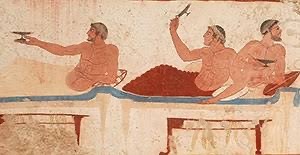
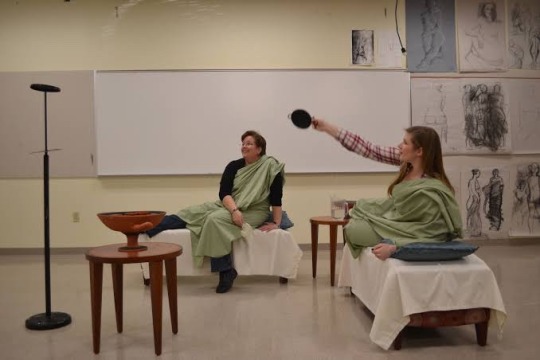
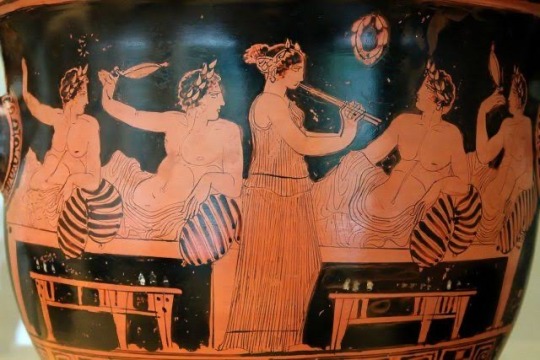

Kottabos
Kottabos was a game of skill played at Ancient Greek and Etruscan symposia (drinking parties), especially in the 6th and 5th centuries BC. It involved flinging wine-lees (sediment) at a target in the middle of the room. The winner would receive a prize, comprising cakes, sweetmeats, or kisses. As Antiphanes wrote in his play: "the kottabos player puts the index finger of the right-hand through the handle of the drinking cup, palm upwards; and the remaining fingers are spread as playing a flute." The player reclines on the couch, leaning on the left elbow; and, moving only the right-forearm, throws the wine-lees.
7 notes
·
View notes
Note
when you get this, list 5 things that make you happy, then put this in the ask of the last 10 people that reblogged from you!
(Hiin it's been so long 😭)
omg hetaira remembers me...i made it.
5? just 5?
My friends :)
Mewsic
Making outfits, like sewing and stuff I feel so accomplished
The love in the world
Strawberries
I'm mentally transmitting this message to everyone they have to answer this in their dreams at night for 50 days and 50 nights.
3 notes
·
View notes
Note
I did consider reading the novel instead but I was like [it will be even more depressing because there will be detailed descriptions] but I still want to give it a try so knowing you liked it more than the manga is an incentive
It will be more depressing because essentially this novel is about the mc's inner workings and his thoughts, in monologue style, which categorically doesnt translate to manga format...so i imagine 80% of the novel is lost in the transition. Its a just dark psychological story about some dude spiralling, and its frightening because it feels relatable lol
1 note
·
View note
Text
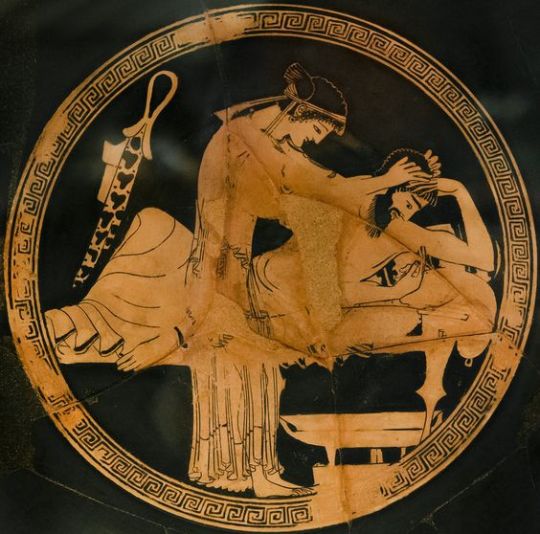
"A hetaira, courtesan, tries to help the man holding up his head."
490-480 B.C
1 note
·
View note
Text
If I were to get a penny every time a movie depicted Ancient Greece and Rome inaccurately, I’d be fucking rich by now
#THERE WERE NO RICH SEXY WOMEN IN PRETTY SLEEVELESS DRESSES#you only dressed like that if you were a rich Spartan or a slave or occasionally a hetaira#Athenian women weren’t even allowed outside#same applied to Rome except women could go out#and you dress in Senator’s clothing if you were an infami#arghhhh#rambles#classical civilisation
1 note
·
View note
Text
¿Historias cortas para no dormir y así no tener pesadillas?
Cuando el trabajo en su empresa (La Multinacional de las almas) se lo permite, dedica sus ratos de ocio a transformarse en una Drag queen, una auténtica reinona que es la envidia de todo el colectivo.

#Cuando el trabajo en su empresa (La Multinacional de las almas) se lo permite dedica sus ratos de ocio a transformarse en una Drag queen una#¿Vieja hetaira?#¿Historias cortas para no dormir?
1 note
·
View note
Text
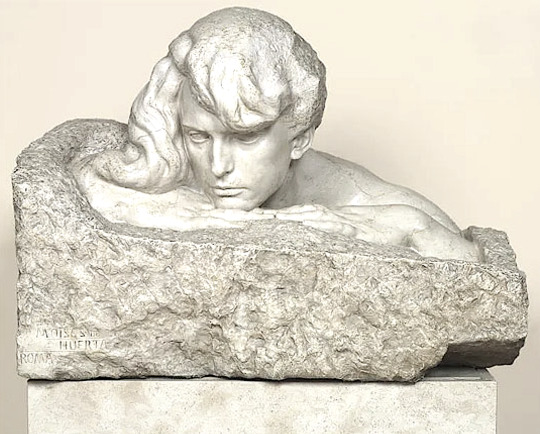
Moisés de Huerta y Ayuso (1881 - 1962) - Hetaira, 1910-1911
131 notes
·
View notes
Text

Rare Bronze Mirror Found in 2,300-Year-Old Grave of Greek Courtesan in Jerusalem
Archaeologists in Israel have discovered what they believe to be the remains of an Ancient Greek courtesan.
The cremated remains of a young woman were found in a burial cave alongside a perfectly preserved bronze box mirror on a rocky slope close to Kibbutz Ramat Rachel, not far from Jerusalem.
The tomb is believed to date back to some time between the late 4th century and early 3rd century BCE, according to a joint study carried out by Tel Aviv University and the Israel Antiquities Authority (IAA).
Guy Stiebel, from the department of archeology and the Ancient Near East at Tel Aviv University, saiid in a phone interview that the find is “very significant.”
“It’s almost like bringing back to life a woman who passed away 2,300 years ago,” he said of the research, which he compared to a “jigsaw puzzle or riddle.”
He and his team believe this could be the first discovery of the remains of a hetaira, as courtesans were known in Ancient Greece.
“If we are correct with our interpretation, it appears that this burial points to the very unique circumstances of what we call a hetaira, a Greek lady who accompanied one of the Hellenistic government officials, or more likely a high general,” he said.
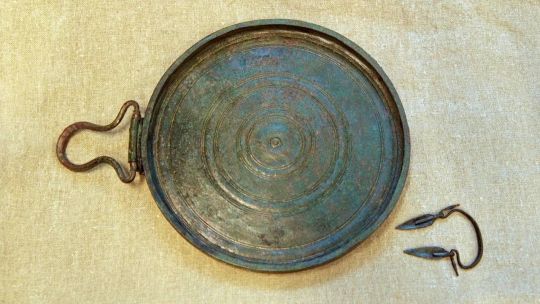
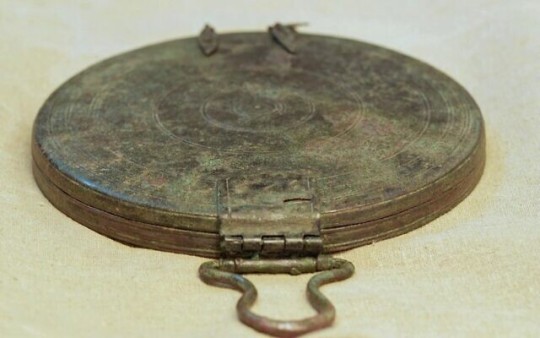

In the Middle East and eastern Mediterranean, the Hellenistic age refers to the period between the death of Alexander the Great in 323 BCE and the conquest of Egypt by Rome in 30 BCE. Stiebel said that he and his team believe the woman would have been among the first Greeks to arrive in the region.
Liat Oz, the director of the excavation on behalf of the IAA, described the mirror found in the tomb alongside the remains.
“This is only the second mirror of this type that has been discovered to date in Israel, and in total, only 63 mirrors of this type are known around the Hellenistic world,” she said in a news release about the discovery.
“The quality of the production of the mirror is so high that it was preserved in excellent condition, and it looked as if it was made yesterday.”
Folding box mirrors such as this were documented in tombs and temples in the Greco-Hellenistic world, the researchers noted. They were usually decorated with engravings or reliefs of idealized female figures or goddesses.

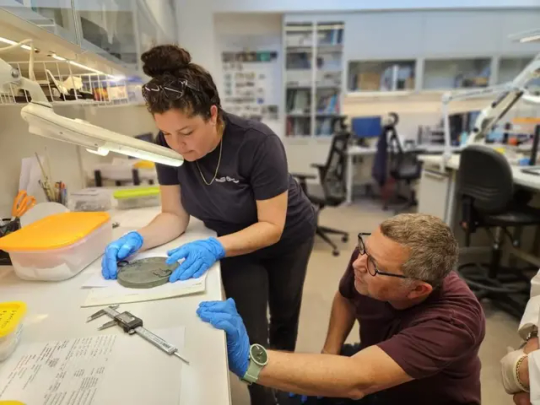
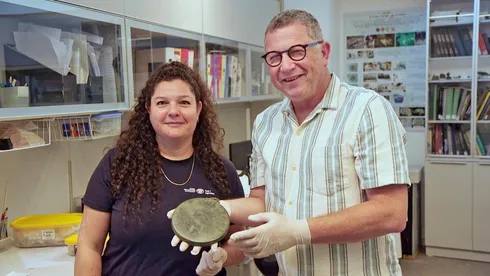
Stiebel said a woman of high status might have received such a mirror as part of a dowry, but this was unlikely to have been the case in this instance as married women rarely left their homes in Greece.
Alternatively, he said, she might have been a courtesan, as they often received gifts from men. Likening the hetairai to Japanese geishas, Stiebel explained that the women were regarded as “muses.”
He said: “Women in society were breaking glass ceilings in very strict and male-oriented Greek society and we do know that they served not only as sexual escorts, but were similar to geishas and provided an element of culture. For that they were given gifts and part of the economy of gifts in Ancient Greece had to do with mirrors.”
The fact the remains were cremated also hinted at the woman’s origins, Stiebel said.
“Cremation is alien to this country and the religion,” he said, explaining that cremation is not only forbidden in Judaism but would not have been practiced by the Persian empire either, which occupied the region at that time.
“The tomb was found in the middle of nowhere, not near any village or farm or settlement, which suggests that she would have been connected with one of the military campaigns and dated to the time of Alexandra the Great or slightly later.



“We are suggesting that maybe she was with one of the generals.”
Stiebel went on to explain the significance of four iron nails found with the mirror and remains.
“Nails were used to protect the deceased and also to protect the living people from the dead. The bodies were literally nailed down to ensure they will not come back to the world of the living,” he said.
Stiebel said that the team are continuing with further research in order to “zoom in” on the finer details of the mirror.
He said: “We hope to shed more light on the origin of the production of the art and maybe shed more light on the history of the owner of the mirror, the general who bought it or where she came from.”
The research will be presented for the first time at an Israeli archaeology conference next month.
By Lianne Kolirin.
#Rare Bronze Mirror Found in 2300-Year-Old Grave of Greek Courtesan in Jerusalem#Ancient Greek courtesan#Kibbutz Ramat Rachel#ancient tomb#ancient grave#ancient artifacts#archeology#archeolgst#history#history news#ancient history#ancient culture#ancient civilizations#hellenistic period#persian empire#greek history
80 notes
·
View notes
Note
Our fag means death.
HEABWJS HELP I SAID FAG? shit the tumblrites aren't gonna be happy with this one
4 notes
·
View notes
Text
My toxic trait is that if I lived in ancient Greece, I would low-key consider becoming a hetaira just so I could hang around at symposiums
#classics#history#tagamemnon#ancient greece#classical studies#athens#history memes#symposium#history shitposting#(athenian) girls just wanna have fun#plato#me coded
14 notes
·
View notes
Text
Alcibiades headcanons that nobody asked for. (These are all made up from my brain for fun)
-Never got acne on his face as a teenager, only occasionally on his upper back. It's a gene thing, his parents didn't get acne either.
-if he focuses a lot he can pronounce the Rs. But since he doesn't have to, he mostly doesn't go through the trouble. The more relaxed he is the more heavy his Ls become.
-He's always carrying something to chew on for fresh breath, be it mint, basil or mastic. He likes mastic in general, and chewing it helps him focus when he's working.
-often goes down to peiraius' taverns by himself to eat fish with his friends there, who are mostly seamen and merchants. They are mostly nice people who don't try to flatter him or sleep with him for political reasons and it's refreshing. They also like gambling and Alcibiades loves gambling, but can't really properly indulge in it with high class aristocratic athenian company.
-can actually drive a chariot very well, but has grown too tall and heavy to do it competitively anymore, which makes him a little sad sometimes.
-the persian cook that he has working at his house really likes him and is always trying to feed him as a love language.
-in typical Athenian fashion, he doesn't eat breakfast. Later in life when he's lived in other places, he realises eating breakfast is actually nice.
-sometimes he believes in the gods, and sometimes he doesn't. It comes and goes.
-his house is full of rugs everywhere. How many rugs does he own.
-his house in Athens isn't that big, but it's full of things, and the elaborate murals on the walls make it look completely full.
-he takes steaming hot, lavender scented baths. At least one hetaira has to be included in that ritual, if only for music.
-has a collection of intricate strigils, but only really used a plain old one that curves just right and has grown a perfect edge from use. Not too sharp, not too dull, completely smooth and easy on the skin.
-when he came back to athens from exile he tried his best to buy back any of his old possessions that he could find.
-will eat snails if he has to, but won't choose to eat them if he has a choice. Same for cicadas, but he will occasionally get a craving for them. Used to be his favorite food as a kid.
-he can eat fried squid until he passes out, Socrates jokes they always have to keep an eye on him when there's squid around.
-when he goes to Persia and tries foods with actual sugar in them he has to try extremely hard to eat in moderation. Tissaphernes is always amused by how much Alcibiades loves sugar.
-he likes flute music a lot. He just doesn't like playing it.
-will sing shanties along with the oarsmen while on his ship.
-the ship modification hammock is mostly a joke and for showing off, he doesn't really get to use it.
-he makes sure to get his ship's eyes repainted as often as possible, and makes them as garishly colorful as possible.
-once he moves to thrace he always wears closed boots with fleece inside. His feet get very cold easily and he doesn't like it.
-has some scars that he's very proud of, and some scars that he's tried every single skin remedy he could find to get rid of. The scars he's okay with are mostly from battles.
-you can tell how busy or not busy he is by wether or not he bothers to complain about the humidity messing up his hair. When he's actually busy he usually just uses a bunch more oil than usual and ignores it.
-socrates had to shame him into cutting his hair for mourning when Pericles died. He really didn't want to cut his hair.
-he's almost always wearing makeup, usually just kohl for everyday things, and more fancy stuff for symposia and special occasions. When he got older, like after 40, he started using more and more kohl to hide the small wrinkles that had started forming around his eyes.
19 notes
·
View notes
Photo
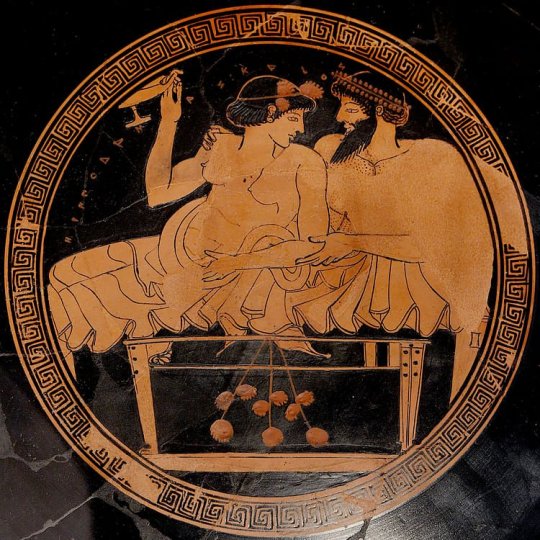
La prostitución en la antigua Atenas
La prostitución en la antigua Atenas era legal y estaba regulada por el estado. Durante el periodo arcaico de Grecia (en torno al 800-479 a.C.) el legislador Solón (que vivió de torno a 630 a 560 a.C.) instituyó los burdeles, que pagaban impuestos, y esta política continuó hasta la época clásica (480-323 a.C.). Para muchas mujeres atenienses, la prostitución era la única manera de ganarse la vida.
Leer más...
1 note
·
View note